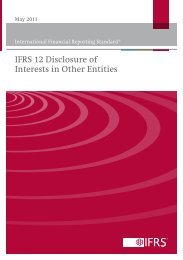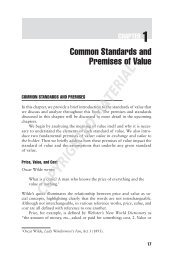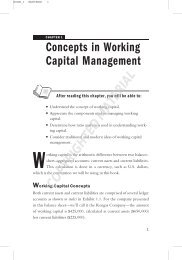ISSUE 5 2008 - Sweet & Maxwell
ISSUE 5 2008 - Sweet & Maxwell
ISSUE 5 2008 - Sweet & Maxwell
Create successful ePaper yourself
Turn your PDF publications into a flip-book with our unique Google optimized e-Paper software.
408 Case & Comment [<strong>2008</strong>]<br />
defendant’s ‘‘loss of confidence’’ in the representative is often not sufficient of itself.<br />
Loss of confidence will often be a natural result of clients not receiving the advice they<br />
wish to hear.<br />
If there is to be a change of representative then clearly it is the responsibility<br />
of the court to determine the appropriate adjournment to ensure that the new<br />
representatives are prepared for their task, and that the trial is not derailed. The Bar<br />
Standards Board Code of Conduct para.701(b)(ii) directs that a barrister should not<br />
undertake any task for which ‘‘he does not have adequate time and opportunity to<br />
prepare for and perform’’. It is suggested however that this refers to the workloads of<br />
individual barristers and the amount of work they choose to undertake. New counsel<br />
will inevitably face problems when stepping into an ongoing trial but this has to be<br />
weighed against the overall fairness of the trial to all parties and to the public. As<br />
discussed above, the trial judge should seek to alleviate any potential disadvantage to<br />
the defendant but ultimately, should it be felt that the defendant suffered an injustice,<br />
the solution should lie in the hands of the Court of Appeal.<br />
It was suggested that the rules of the Solicitors’ Code of Conduct were not<br />
compatible with this position in that solicitors were entitled to decide which client to<br />
take on and were not subject to the ‘‘cab-rank rule’’. As such, though barristers might<br />
have to pursue a case despite not having the preparation time they might feel is<br />
appropriate, this is not the position for the solicitor. Should solicitors take on a case<br />
without what they would consider to be adequate preparation time, that decision might<br />
fall foul of r.2.01 which states that:<br />
‘‘You are generally free to decide whether or not to take on a particular<br />
client. However, you must refuse to act or cease acting for a client in the<br />
following circumstances ...(b) Where you have insufficient resources or lack<br />
the competence to deal with the matter.’’<br />
However, in cases such as this the problem of preparation time arises not through the<br />
absence of appropriate resources but because of a judge’s ruling. Both barrister and<br />
solicitor owe a duty to the court and that duty is not different in its application. Indeed,<br />
r.1.01 of the Solicitors’ Code states that ‘‘[y]ou have obligations not only to clients<br />
but also to the court and to third parties’’. Ultimately, if there is a lack of preparation<br />
time it is likely to be the defendant who is disadvantaged but this potential problem<br />
can only be appropriately tackled by a case-specific determination of what secures<br />
fairness for the process as a whole. It is submitted that this view of the Solicitors’<br />
Code must be correct. To hold otherwise would be to frustrate the judge’s ruling and<br />
potentially jeopardise the fairness of the proceedings. Given that counsel would be<br />
expected to have ‘‘soldiered on’’ it would be anomalous not to be expect the solicitor<br />
to do likewise.<br />
[N.W.T.]<br />
© SWEET &MAXWELL






